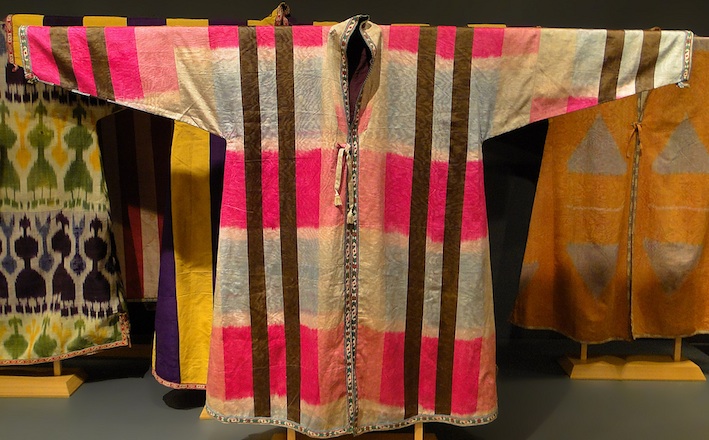Commentary on Exodus 32:1-14
The people behold the statue Aaron has poured and shaped from molten metal and declare, “this is your god, O Israel, who brought you up out of the land of Egypt” (Exodus 32:4).
This statue, at last, they can see and touch. They can bring offerings before it, feast and dine with their chosen god, and truly celebrate with this god the miracle of their deliverance.
Before this moment, the people have struggled to know that God is in their midst (Exodus 17:7). By day they see a cloud, by night a column of fire (Exodus 13:21). Cloud obscures vision, hiding its secrets within. Fire defies touch, creating distance between the God within and the people without. They have seen and eaten strange bread and birds that appeared upon the ground (Exodus 16:13-14). They were told that this food is how they would know that God is the one who led them to freedom (Exodus 16:12, 31). But for so long they did not see God’s face and they did not hear God’s own voice. They asked questions of God by speaking to God’s servant Moses (Exodus 18:15). Moses became their living link to the hidden presence that eluded their senses.
At the foot of Sinai God called out to Moses and promised to speak to him from a cloud, so that the people would at last hear God’s voice and trust in God’s presence and God’s servant (Exodus 19:3, 9). Yet even this encounter would be circumscribed. What exactly would the people hear? For God and Moses would be on the mountain, while the people remained below. They could not go up it or even touch its edges, on pain of death (19:12). What they heard were not words of assurance, but the forbidding sound of thunder (19:16, 19).
If they had been led into the wilderness to worship their deity, as Moses had so often told Pharaoh they would do (Exodus 5:1 and passim), would they not there, at last, be able to see God? They were permitted to offer sacrifice from a distance (Exodus 24:1-2). Moses, Aaron, Nadab, Abihu, and seventy elders, were permitted to “go up” — we are not told how far — and there they indeed saw God (24:9-10). The chiefs of the people also saw God as they feasted (24:11). Perhaps now these leaders would testify to their vision and all would grasp with certainty that God is with them, not this once only, but always.
But God ghosted. The feet that stood on a pavement of sapphire (Exodus 24:10) seemed to have turned and walked away. And now Moses has disappeared, too (24:12-18). A month passed. Then ten days more (24:18). And the people have heard nothing from this man who did not grow up among them and yet claimed to do the work and speak the word of YHWH, God of Israel. Perhaps Moses was dead. What would he eat on that mountain, anyway? “This Moses,” say the people to Aaron, in tones of distance, disowning, and disaffection, “we don’t know…” (Exodus 32:1). So you — the one who is here with us now — make us something we can see. Make us something that will lead us forward, and we will follow it.
And strangely, the brother of Moses, the man who would later be consecrated high priest of Israel (Leviticus 8-9), did not balk at their request. He asked the people to give over their jewelry (Exodus 32:2) — rings of gold adorning their ears, gifts of plunder from the Egyptians (Exodus 12:35-36), tokens of an economy of slavery with which they continued to pierce their own flesh and adorn the bodies of their children. And when they did so (Exodus 32:2), Egypt’s twice-stolen wealth took on new shape, contoured into an image of strength, virility, and power (32:4).
The phrase “from the land of Egypt” occurs 5 times in this passage (Exodus 32:1, 4, 7, 8, 11; also 32:23), making the density of repetition of this phrase greater here than anywhere else in Scripture (Exodus 12 contains the phrase four times). This recurring motif raises three questions: who led the people out of Egypt? what now separates them from the life they knew there? How will they move forward into the land of promise?
Removing the gold adornments plundered from their captors might have been a first step away from the legacy of slavery in Egypt. But in crafting an idol from the wealth of Egypt, the people only moved backward. Moses must now challenge and negotiate with God in hopes of ensuring that God’s true presence — not the visible and tangible but false substitute of a carved, taurine image — will indeed remain with the people and lead them to the land God promised to Abraham, Isaac, and Israel — Israel the man, and Israel the people descended from him (Exodus 32:13).
It is easy to mistake our own creations for our God. It is tempting to shape our plundered riches, our wages, and even the reparations for our losses into an image that pleases our senses, mollifies our anxiety, and invites admiration from our neighbors. But that thing we have made from Egypt’s gold is not our god. That thing may symbolize strength and power. It may personify virility, or femininity, or aspects of both or neither; it may embody rebellion or conformity, generosity or greed. But as close as we draw to it, as much as we celebrate it and place it at the center of our lives, it did not lead us to freedom and will not lead us to our promised inheritance. It will tether us to slavery, to a worldview in which people are expendable, interchangeable commodities. It will moor us in the impatience of our ignorance and fear. We may dance with it for a day, but soon find that it has led us to our death.
The hard way forward reckons with a divine presence that continues to elude our senses even as it fills and animates them. The hard way forward knows the pain of absence and doubt, but still chooses to follow cloud and fire through the desert-landscape of freedom. And the living link between us and our God is the one who challenges and negotiates with God for our forgiveness, for God’s enduring presence among us, and for the fulfillment of every promise God has made to God’s people.


October 15, 2017